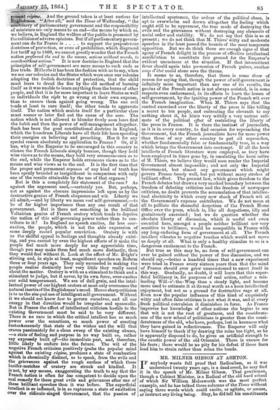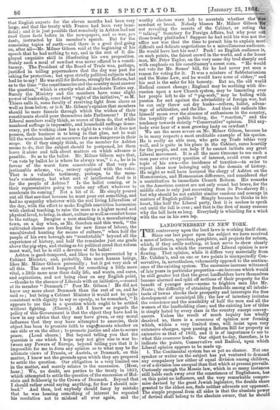MR. MILNER GIBSON AT A.SHTON.
IF anybody wants full proof that Radicalism, as it was understood twenty years ago, is a dead creed, he may find it in the speech of Mr. Milner Gibson. That gentleman, though a Cabinet Minister, is a Radical of the old hard school of which Sir William Molesworth was the most perfect example, and he has talked three columns of the Times without saying three words which could excite, or agitate, or amuse, or instruct any living being. Stay, he did tell his constituents that English exports for the eleven months had been very large, and that the treaty with France had been very bene- ficial ; and it is just possible that somebody in Ashton had not read those facts before in the newspapers, and so was, pro tanto, instructed by his member's speech. But for the remaining topics of earth—and there is a good deal going on, after all—Mr. Milner Gibson said at the beginning of his speech that he had nothing to say, and in the rest of it dis- played exquisite skill in illustrating his own proposition. Surely such a meal of sawdust was never offered to a consti- tuency. The President of the Board of Trade was, perhaps, justified in telling papermakers that the day was past for asking for protection; but upon strictly political subjects what had he to say? He was still for Reform, strongly for Reform, but as to the time "the constituencies and the country must answer the question," which is exactly what all moderate Tories say. Surely the Ministry and the members have some slight power of leadership, some faint "right of the initiative," as M. Thiers calls it, some faculty of receiving•light from above as well as from below, or is it Mr. Gibson's opinion that members should be mere funnels through which the wishes of their constituents should pour themselves into Parliament? If the Liberal members really think, as scores of them do, that while manhood suffrage is impossible, and household suffrage demo- cracy, yet the working class has a right to a voice it does not possess, their business is to bring in that plan, not to wait till the workmen insist on measures far more dangerous in their scope. Or if they simply think, as the member for Ashton seems to do, that the subject should be postponed, let them leave it alone and talk about matters on which advance is possible. So as to the ballot. Mr. Milner Gibson says that, "on vote by ballot he is where he always was," i. e., he is in favour of the worst form conceivable of that very ob- jectionable scheme, viz., secrecy optional with the voter. That is a valuable testimony, perhaps, to the mem- ber's consistency, but what sort of intellectual food is it for the people of Ashton ? Is the ballot coming, or is their representative going to make any effort whatever to accelerate its coming ? Not a bit of it. He simply poured out all that sawdust because he must pour out something, and had no sympathy whatever with the real living Liberalism of the day, with the effort to make English conviction harmonize with clerical teaching, to raise the mass to a higher moral and physical level, to bring, in short, culture as well as comfort home to the cottage. Imagine a man standing in a manufacturing town, on a day when, as Mr. Goschen said this week, "the cultivated classes are hunting for new forms of labour, the uncultivated hunting for means of culture," when half the people of his own borough are "comfortable" beyond all the experience of history, and half the remainder just one grade above the pig-stye, and stating as his political creed that reform must wait, but he is still a devotee of the ballot !
Ashton is good-tempered, and likes to be represented by a Cabinet Minister, and, probably, like most human beings, likes Mr. Milner Gibson personally ; but it got very sick of all this. The crowd hungered for something a little more vital, a little more near their daily life, and wants, and cares, and aspirations, and not being clear on any English point, —thanks to the absence of Liberals with an initiative,—roared at its member " Denmark !" Poor Mr. Gibson ! He did not know any more about Denmark than the rest of us, and he said so ; but being a Cabinet Minister it would not be quite consistent with dignity to say so openly, so he remarked, " It appears to me this is a question which ought to be settled without fighting. (Cheers.) All I know as regards the policy of this Government is that the object they have had in view in any advice that they may have given, or any moral influence that they may have attempted to exercise, their object has been to promote faith to engagements whether on one side or on the other ; to promote justice and also to secure peace. (Loud cheers.) But beyond telling you that the question is one which I hope may not give rise to war be- tween any Powers of Europe, beyond telling you that it is impossible for me to form any opinion as to what may be the ultimate views of Prussia,. or Austria, or Denmark, on this matter, I know not the grounds upon which they are prepared to settle the question. Our obligation is a very limited one in the matter, and merely relates to the succession. (Hear, hear.) We, no doubt, are parties to the treaty in 1852, which attempted to settle the question of the succession of Hol- stein and Schleswig to the Crown of Denmark. Beyond that I should rather avoid saying anything, for fear I should mis- lead." And then, lest anybody should fancy by mistake that he was hearing something of interest he repeated his resolution not to mislead all over again, and the worthy electors were left to ascertain whether that sawdust or bread. Nobody blames Mr. Milner Gibson not revealing the secrets of the Cabinet, or acting " talking" Secretary for Foreign Affairs, but why pour o those trashy platitudes ? Suppose he had said his was not the* office nor was that the time to permit him to explain most`Z: difficult and delicate negotiations to a miscellaneous audience. He would have lost his seat? Pooh ! an English audience is, on such points, the fairest crowd in the world, and a far lesser man, Mr. Peter Taylor, on the very same day trod sharply and with emphasis on his constituency's sorest corn. " He would not vote for Mr. Somes' bill, for he had never yet seen a reason for voting for it. It was a mixture of Sabbatarianisin and the Maine Law, and he would have none of either," and his seat is the safer for his honesty. But no, the old world Radical cannot change ; England may be seething with dis- cussion upon a new Church system, may be lamenting over her people left to die of 'pig-scab," may be boiling with passion for and against the advisability of foreign war, but he can only throw out dry husks—reform, ballot, advan- tage of arbitration, and the like. And then old radicals like himself moan over the absence of enthusiasm in the country, the torpidity of public feeling, the " reaction," and the tendency towards strictly " Conservative" opinion. Did any- body ever hear of a man growing lusty on sawdust ?
We are the more severe on Mr. Milner Gibson, because he is in many respects a most creditable example of his species. He is really an able man, who gets up Trade tables very well, and is quite in his place in the Cabinet, cares heartily for the people, and can help if he cannot initiate any great Liberal movement. It is all the more tiresome to see such a man pass over every question of interest, avoid even a great topic of his own—the incidence of taxation—in order to• repeat ideas now belonging only to the domain of history. He might as well have lectured the clergy of Ashton on the Homoiousian, and Homoousian difference, and considered that a contribution to immediate Church Reform. His remarks on the American contest are not only sound but brave, for the middle class is only just recovering from its Pro-slavery fit ; but why should he not exhibit similar candour and courage in matters of English politics ? Simply because he thinks in his- heart, like half the Liberal party, that it is useless to speak out until the lull is over ; and that is the first of many reasons why the lull lasts so long. Everybody is whistling for a wind_ with the oar in his own lap.



































 Previous page
Previous page